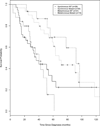Influence of KRAS mutation status in metachronous and synchronous metastatic colorectal adenocarcinoma
- PMID: 22674181
- PMCID: PMC3839285
- DOI: 10.1002/cncr.27666
Influence of KRAS mutation status in metachronous and synchronous metastatic colorectal adenocarcinoma
Abstract
Background: Mutations in the v-Ki-ras2 Kirsten rat sarcoma viral oncogene homolog (KRAS) are present in approximately 30% to 40% of colorectal adenocarcinomas. Wild-type (WT) KRAS mutation status is predictive of tumor response with epidermal growth factor receptor-directed therapies, but the results from studies evaluating the prognostic value of KRAS status in localized disease have been contradictory. The prognostic value of KRAS in metastatic disease, specifically according to whether patients have synchronous or metachronous disease at presentation, is less understood.
Methods: One-hundred ten consecutive patients with metastatic colorectal adenocarcinoma underwent testing for KRAS exon 2 mutations by polymerase chain reaction amplification and direct nucleotide sequencing. The clinical characteristics, treatments, and outcomes of these patients were then analyzed retrospectively, stratified according to whether patients presented with synchronous or metachronous metastasis and according to KRAS mutation status (WT or mutated).
Results: For the entire cohort, the median overall survival from the date of diagnosis of metastatic disease was 34.3 months (95% confidence interval, 28.3-49.4 months) for patients with WT KRAS (n = 70). The median overall survival for patients with mutated KRAS (n = 40) was 40.3 months (95% confidence interval, 27.9-51.1 months; log-rank P = .91). Kaplan-Meier survival analysis indicated that 3-year overall survival and 5-year overall survival were not statistically different. Within the subgroups of patients with synchronous and metachronous metastatic disease, no significant differences were observed in median overall survival, 3-year overall survival, or 5-year overall survival between the WT KRAS and mutated KRAS groups.
Conclusions: In this study, KRAS mutation status did not influence overall survival in either synchronous or metachronous metastatic colorectal adenocarcinoma and, as such, had no prognostic role in this disease setting.
Copyright © 2012 American Cancer Society.
Conflict of interest statement
CONFLICT OF INTEREST DISCLOSURES
Dr. Bekaii-Saab is a consultant for Amgen, Bristol-Meyer Squibb, and Genentech.
Figures



Similar articles
-
The prognostic values of EGFR expression and KRAS mutation in patients with synchronous or metachronous metastatic colorectal cancer.BMC Cancer. 2013 Dec 13;13:599. doi: 10.1186/1471-2407-13-599. BMC Cancer. 2013. PMID: 24330663 Free PMC article.
-
Impact of systematic EGFR and KRAS mutation evaluation on progression-free survival and overall survival in patients with advanced non-small-cell lung cancer treated by erlotinib in a French prospective cohort (ERMETIC project--part 2).J Thorac Oncol. 2012 Oct;7(10):1490-502. doi: 10.1097/JTO.0b013e318265b2b5. J Thorac Oncol. 2012. PMID: 22982650
-
FOLFOX4 Plus Cetuximab for Patients With Previously Untreated Metastatic Colorectal Cancer According to Tumor RAS and BRAF Mutation Status: Updated Analysis of the CECOG/CORE 1.2.002 Study.Clin Colorectal Cancer. 2015 Jun;14(2):91-8. doi: 10.1016/j.clcc.2014.12.003. Epub 2014 Dec 24. Clin Colorectal Cancer. 2015. PMID: 25666295 Clinical Trial.
-
Prognostic Value of KRAS Gene Mutation on Survival of Patients with Peritoneal Metastases of Colorectal Adenocarcinoma.Int J Surg Oncol. 2021 Sep 13;2021:3946875. doi: 10.1155/2021/3946875. eCollection 2021. Int J Surg Oncol. 2021. PMID: 34557315 Free PMC article. Review.
-
Concordant KRAS mutations in primary and metastatic colorectal cancer tissue specimens: a meta-analysis and systematic review.Cancer Invest. 2012 Dec;30(10):741-7. doi: 10.3109/07357907.2012.732159. Epub 2012 Oct 17. Cancer Invest. 2012. PMID: 23075074
Cited by
-
Alternatives for the intensive follow-up after curative resection of colorectal cancer. Potential novel biomarkers for the recommendations.Pathol Oncol Res. 2013 Oct;19(4):619-29. doi: 10.1007/s12253-013-9672-7. Epub 2013 Jul 19. Pathol Oncol Res. 2013. PMID: 23868031 Review.
-
Association Between Specific Mutations in KRAS Codon 12 and Colorectal Liver Metastasis.JAMA Surg. 2015 Aug;150(8):722-9. doi: 10.1001/jamasurg.2015.0313. JAMA Surg. 2015. PMID: 26038887 Free PMC article.
-
High MACC1 expression in combination with mutated KRAS G13 indicates poor survival of colorectal cancer patients.Mol Cancer. 2015 Feb 14;14:38. doi: 10.1186/s12943-015-0316-2. Mol Cancer. 2015. PMID: 25742883 Free PMC article.
-
The prognostic values of EGFR expression and KRAS mutation in patients with synchronous or metachronous metastatic colorectal cancer.BMC Cancer. 2013 Dec 13;13:599. doi: 10.1186/1471-2407-13-599. BMC Cancer. 2013. PMID: 24330663 Free PMC article.
-
KRAS and BRAF Mutations as Prognostic and Predictive Biomarkers for Standard Chemotherapy Response in Metastatic Colorectal Cancer: A Single Institutional Study.Cells. 2020 Jan 15;9(1):219. doi: 10.3390/cells9010219. Cells. 2020. PMID: 31952366 Free PMC article.
References
-
- Vogelstein B, Fearon E, Hamilton S, et al. Genetic alterations during colorectal tumor development. N Engl J Med. 1988;319:525–532. - PubMed
-
- Linardou H, Briasoulis E, Dahabreh IJ, et al. All about KRAS for clinical oncology practice: gene profile, clinical implications and laboratory recommendations for somatic mutational testing in colorectal cancer. Cancer Treat Rev. 2011;37:221–233. - PubMed
-
- McDermott U, Longley DB, Johnston PG. Molecular and biochemical markers in colorectal cancer. Ann Oncol. 2002;13(suppl 4):235–245. - PubMed
-
- Bos JL. Ras oncogenes in human cancer: a review. Cancer Res. 1989;49:4882–4689. - PubMed
MeSH terms
Substances
Grants and funding
LinkOut - more resources
Full Text Sources
Medical
Research Materials
Miscellaneous

